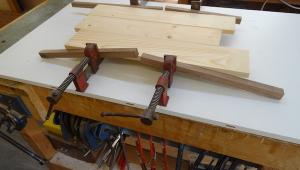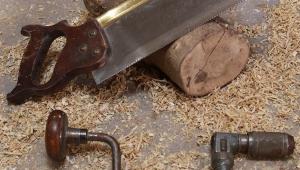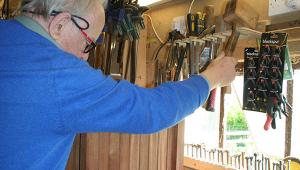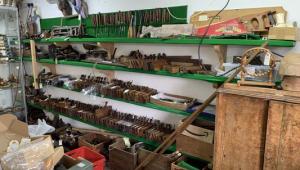Outta Space

Outta Space
When small isn’t beautiful
If it’s a bad workman that blames his tools, is it a bad workman that blames his workshop? I don’t think so. Can you expect an athlete to run in shoes a size too small? Can a violinist be virtuosic with a string missing? How then, if you have a workshop that doesn’t allow you to rotate an 8×4 sheet and swivel a 12ft plank (not necessarily at the same time) are you not allowed to be annoyed? When you complain – to yourself if no one else – that you can’t be expected to work in conditions like this, trust yourself: you’re right.
Some frustrations are obvious. Physical constrictions means that some jobs cannot be undertaken and shouldn’t be tried. Overcrowding in the workshop (you, the tools and all the stuff) leads to bad practice. You do things you’d rather not do because there is no other way. Machines aren’t given their proper working area. You don’t stand right. You think that piece of wood will miss the can of oil but you can’t be sure and you can’t check without bending your bones underneath some planks laid out on a trestle, and you’ve been under there too often already. You’ll risk it.
And then there’s the clutter. It’s not just the stuff you need but the stuff you might need. Woodworkers are closely related to squirrels. This is not a weakness. Squirrels are very clever. They are inventive and tireless, but like woodworkers they sometimes put things in silly places; or put them somewhere sensible and then forget where. This is why saplings grow in the middle of lawns.
How to be smug
You need a system. A system means that everything knows where it belongs. When it’s not being useful, it goes there. And, by the same token, when you haven’t seen it for a while and you suddenly need it, you know just where to find it. When you do, you have the bonus of smug self-satisfaction. The second law of thermodynamics states (correct me if I’m wrong) that the universe is gradually falling apart. That includes your workshop. It naturally tends towards disorder. To reverse this process, you have to pick things up as you pass them whether you want to or not, and put them back where they came from. It’s tedious. A not inconsiderable time can be spent countering entropy. And every now and again, a whole day can be consumed by radically sorting out, tidying up and rearranging, in the vain hope that this time your world will stay in order.
How to be warm
Off cuts have to be the bane of the woodwork shop. Racks strung up to the ceiling get packed with odd bits slid in, and everything covered in dust. A stack resting against the wall will behave itself for a while but then reach critical mass and cascade over the floor like logging down a river. The only thing that has worked for me is a rack made of galvanised water pipe (presumably by the plumber who used to have my last house – he connected the village to the water main in the 1930s – every house but his own!) such that short tubes stood out from the wall horizontally, and timber could be loaded and unloaded without obstruction. First, though, be brutal. Unless it really is too good to discard, burn it. Winter is good for this. When you can’t feel your fingers, you’re less sensitive to waste.
How to be rich
The rewards of good woodwork-shop-keeping are enormous. Literally. You can convert a dangerous cramped cupboard into a ballroom. Well, maybe that’s going too far, but it can feel a bit like that. When you come back in the morning subconsciously expecting the same old congestion and find empty floor space, a clear bench and tools sitting politely together in their families waiting for action, your heart will lift. You have fresh affection for your workshop, and fresh affection for woodwork. The job you’ve been putting off for months, you now can’t wait to begin.
© Edward Hopkins 2017
Read more articles in Good Woodworking October 2017
For more great articles subscribe to Good Woodworking today
- Log in or register to post comments











